At least six killed and 30 injured in devastating day of clashes in Beirut
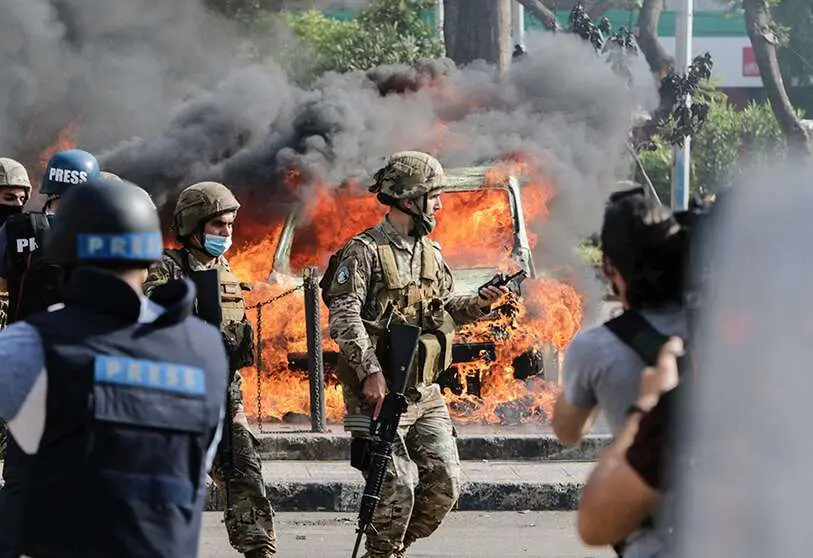
Snipers on top of buildings, gunfire at ground level, roadblocks and burning vehicles. Chaos and confrontation. The southern Beirut neighbourhood of Tayouneh became a battleground on Thursday, with six people killed and some 30 wounded. Lebanon's capital witnessed levels of violence unseen since 2008, and witnessed scenes reminiscent of the civil war that ravaged the country between 1975 and 1990.
Gunmen opened fire on a demonstration called by Hezbollah and the Amal Movement, killing six people, all of them Shi'a faith. The Party of God accused the Lebanese Forces, a right-wing Christian formation, of being behind an attack that led to open warfare just metres from Lebanon's nerve centre and forced the army to deploy rapidly.
The Red Cross and the Lebanese authorities recorded a mass exodus of residents fearing a new wave of violence and assisted in the evacuation of schools and homes. Panic gripped neighbours and, as a result of the fighting, shops and premises were razed to the ground and cars reduced to ashes.
During their intervention, the army warned that they would open fire on any armed person. The authorities later announced the arrest of nine people involved in the clashes, including a Syrian national, according to NNA. Meanwhile, other parts of the city remained quiet, with the only anomaly being the continuous echo of ambulances.
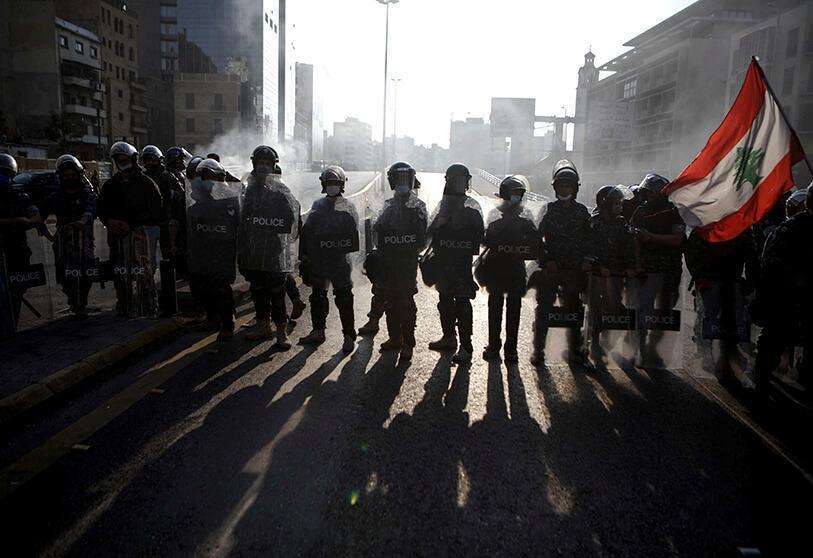
The Shiite militia had called on Thursday for a demonstration against Judge Tarek Bitar, who is in charge of the case investigating the explosion in the port of Beirut, one of the largest non-nuclear detonations in history that killed more than 200 people, injured some 7,500 and destroyed many neighbourhoods of the capital. Tensions began hours earlier with the ruling of the Court of Cassation, which rejected Hezbollah's request to remove the magistrate from the investigation.
Bitar is continuing the investigation despite strong pressure from various political groups. There is some fear among the Lebanese elite about the court's possible ruling, which would entail a series of criminal consequences for several senior government officials linked to the Amal movement, which is close to Hezbollah's Shi'a militia.
In fact, Bitar has indicted a long list of politicians and senior administration officials suspected of the negligence that led to the explosion at the port of Beirut. Some 2,750 tonnes of ammonium nitrate, a chemical compound used in both fertilisers and bombs, were stored there under strange conditions. To date, all those named have denied wrongdoing.
Bitar is not the first judge to investigate the case. Previously, Magistrate Fadi Sawan tried to unravel the facts, but came under intense political pressure that led to his removal as head of the case in February. Before his successor, Sawan ran up against the immovable subservience of the Lebanese state, characterised by a corrupt structure that is rife with malfeasance and impunity.
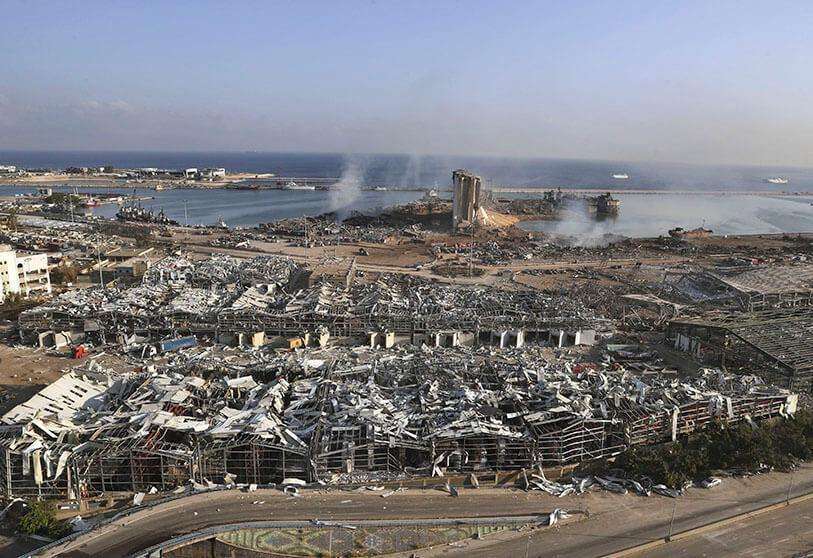
The investigation into the case has been backed from the outset by the Free Patriotic Movement led by President Michel Aoun, who has a Christian majority but broad Muslim support, which has led to tensions between the head of state and Hezbollah, a close ally in the institutions. The causes of the blast are a source of tension for Christian parties because, while the port explosion killed many Muslims, most of the material damage occurred in Christian areas.
The last straw, however, was the magistrate's issuing of an arrest warrant for the former finance minister and trusted confidant of the Shia Speaker of Parliament, Ali Hassan Khalil, and the former minister of public works, Ghazi Zaiter, figures close to the orbit of the Party of God that militates in the Amal movement. This led Hezbollah's charismatic leader, Hasan Nasrallah, to accuse Bitar of being biased and "politicised". Words that inflamed his acolytes.
The magistrate has attempted to question non-Shiite officials, such as then-Sunni Prime Minister Hassan Diab and Christian representative Youssef Fenianous. Many of them have appealed for immunity as public officials to avoid the summons, and the rest face the progress of the investigations with uncertainty. Hence, a minister close to Hezbollah declared, along with other members of the executive, that if Bitar was not dismissed immediately, they would call for a demonstration in Beirut to demand his head. Said and done.
But the course of events was not planned. At the start of Thursday's mobilisation, as the demonstrators headed towards the Palace of Justice in the Adaleya area to protest outside the investigating judge's office, they "faced an armed assault by Lebanese Forces party groups, who had spread out in nearby neighbourhoods and on the rooftops of buildings, and began their direct sniper operations to kill on purpose", Hezbollah said.
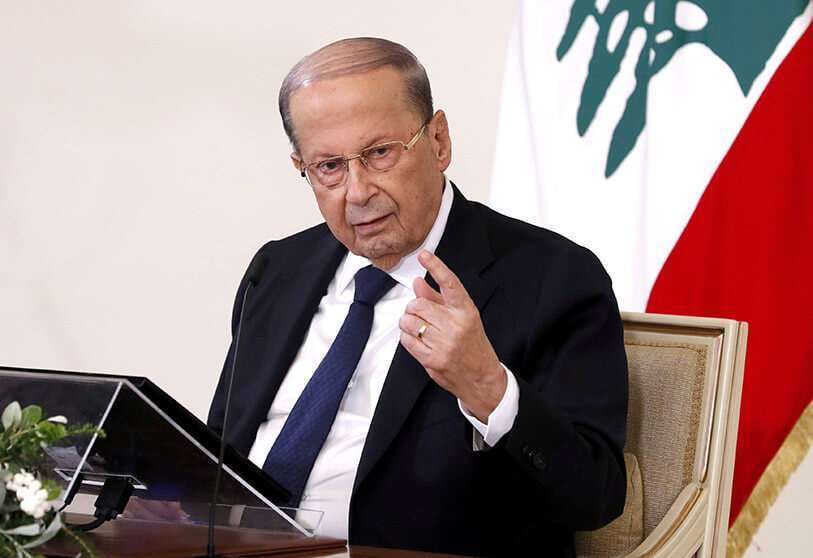
Witnesses have not been able to identify the group to which the snipers belong, if they are related to any organisation. Meanwhile, the Lebanese Forces (LF) flatly rejected the accusation and denounced the Party of God for provoking and instigating the clashes. Its leader, Samir Geagea, condemned the events and called on the president and the prime minister "to carry out full and thorough investigations to determine responsibility for what happened today in the capital".
President Aoun assured that he would not tolerate or give in to "any fait accompli whose aim may be sedition", and that the events would be subject to security and judicial follow-up. "And I, for my part, will ensure that the investigation will get to the truth of what happened so that the perpetrators and instigators will be held accountable like any other judicial investigation, including the investigation of the port crime, which was and will remain a priority of my work and my commitment to the Lebanese and the international community," he said.
Najib Mikati, the re-elected prime minister, told Reuters that Lebanon is like a "patient in front of the emergency room". Mikati acknowledged that the events were a setback for the country, but said he was focused on economic recovery efforts. The Lebanese financial system collapsed in 2019 after decades of corruption, and its currency has lost 90% of its value. This problem is compounded by deep energy shortages.
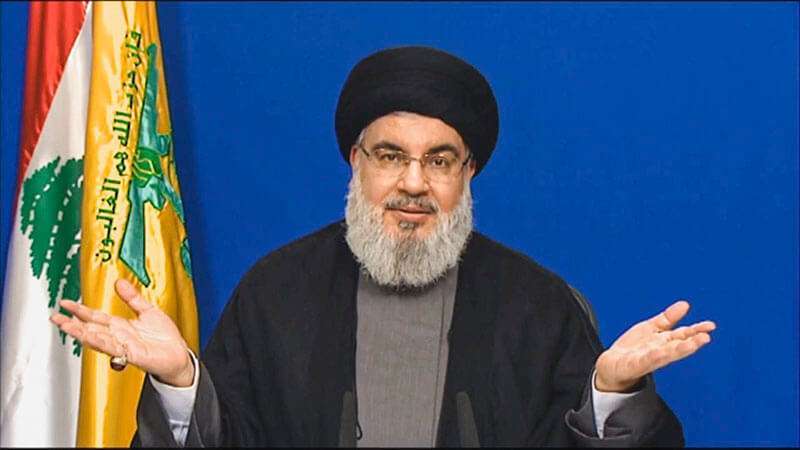
Mikati, Lebanon's richest man, has headed the government since September. After a year of institutional deadlock, the new government will have to implement the necessary reforms to get the country out of the impasse within a year, as new elections are scheduled for 2022. This explains the interest of certain parties in heating up the atmosphere and mobilising their electorate.
Lebanon, which is home to more than a dozen religious sects, has been considered a model of pluralism and coexistence following the power-sharing agreement between the different professions with a Christian president, a Sunni Muslim prime minister and a Shia Muslim speaker of parliament, among others. However, the emergence of the Hezbollah militia, founded by the Iranian Revolutionary Guard, threw the balance out of balance.
The so-called Party of God, backed from Tehran, operates as a shadow state. In fact, the organisation controls its own army and weapons arsenal, and not only that, but also has members in the cabinet. Its position was decisive for the appointment of the current prime minister, and its ramifications within state structures make it the country's main power.








